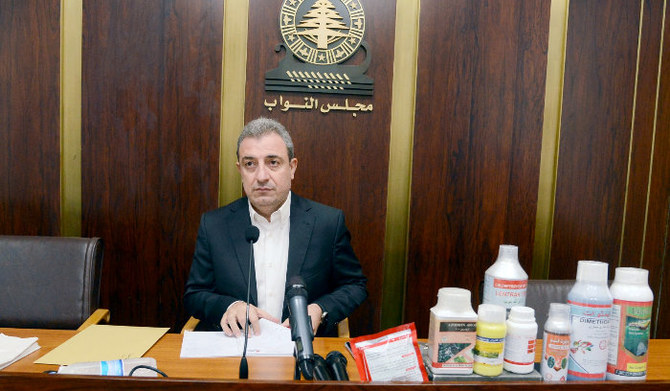
- ARAB NEWS
- 13 Jul 2025

BEIRUT: Banned pesticides linked to cancer and other illnesses are being smuggled into Lebanon and used by farmers across the country, a former Lebanese health minister has claimed.
Wael Abou Faour said on Wednesday that harmful agricultural products prohibited in most countries are freely available on the Lebanese market and pose a growing threat to public health.
Some farmers are using the pesticides “out of ignorance, while others are aware of their danger, but use them out of lack of conscience,” the Democratic Gathering MP said.
Many of the toxic products have been the subject of warnings by the World Health Organization and Food and Agriculture Organization because of their links to cancer and other life-threatening diseases, as well as poisoning and childhood illnesses.
The former health minister said that the Lebanese are struggling because of the government’s inability to secure medicines, including cancer treatments.
“How would the situation be if their food is also poisonous and carcinogenic?” he asked.
Dangerous pesticides are being smuggled mainly through Syria via organized crime groups, with most farmers in Akkar, the Bekaa Valley and Mount Lebanon now using the products, Abou Faour claimed.
He said that prohibited products also enter the country “in barrels, through the port of Beirut, disguised as cleaning materials, to be repacked and sold to farmers later.”
Smugglers used fraudulent approvals by some ministries, especially the Ministry of Health, as well as fake invoices, to suggest the dangerous substances are cleaning products for warehouses and homes, he said.
The MP questioned the Lebanese Customs Administration’s knowledge of the issue, as well as its ability to control what he described as a “smuggling disaster.”
Corruption in the port is widespread, he said, adding that “details will be revealed later.”
Ibrahim Tarshishi, head of the Bekaa Farmers Association, told Arab News that tampering with agricultural fertilizers is also a problem.
“A certain formula will be printed on the outer bag, but upon use, we find that only 30 percent of the formula is present in the bag,” he said.
In a report published last year, the FAO revealed that Lebanon has one of the world’s highest rates of fertilizer and pesticide use.
The report also warned that the country suffers from soil erosion and degradation, with 39 percent of land being severely degraded.
During his press conference, Abou Faour described farmers as the “the weakest link in the existing circle of corruption.”
He urged the Ministry of Agriculture to withdraw all dangerous products from the market and warn farmers against their use.
Environmental experts say that dangerous chemicals smuggled into the country “are entering and staying in the food chain, causing serious health problems, and threatening biodiversity with many visible and unforeseen risks.”